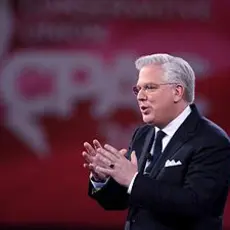Glenn Beck felt that his television program last night was so important that he took to Facebook to tell his fans that "if you only watch one show the rest of this year from me on the blaze, make it today's." What his viewers found if they tuned in was David Barton promoting Seven Mountains dominionism, a movement that believes that Christians must gain control of the seven main cultural centers in order to create a "virtual theocracy" in America:
Barton has been openly promoting Seven Mountains since 2011 and now Beck is likewise on board, declaring in a separate Facebook post last night that "there are seven hills of culture. If you plan on surviving as a culture you must have these seven hills."
But all of this dominionist rhetoric was really just a lead-up to the release of a poll conducted by Christian pollster George Barna that reportedly found that churchgoers want their pastors to deliver more sermons opposing things like gay marriage and abortion rights and Islam.
The poll itself was conducted by Barna through the American Culture and Faith Institute, which just so happens to be "the public opinion research arm of United in Purpose," a Religious Right effort started several years ago for the purpose of mobilizing millions of right-wing Christians to vote.
To hear Barton, Beck and Barna tell it, the poll found that the average churchgoer is simply dying to have their pastor take on a whole host of controversial issues from the pulpit:
Top 12 Issues the Church Wants to Hear:
1. Abortion: Beginning of life, right to life, contraception, adoption, unwed mothers. 91%
2. Religious persecution/liberty: Personal duty, government duty, church response, global conditions. 86%
3. Poverty: Personal duty, government role, church role, homelessness, hunger, dependency. 85%
4. Cultural restoration: Appropriate morals, law and order, defensible values and norms, self-government. 83%
5. Sexual identity: Same-sex marriage, transgenderism, marriage, LGBT. 82%
6. Israel: Its role in the world, Christian responsibility to Israel, US foreign policy toward Israel and its enemies. 80%
7. Christian Heritage: role of Christian faith in American history, church role in US development, modern-day relevance. 79%
8. Role of Government: Biblical view, church-state relationship, personal responsibility, limitations. 76%
9. Bioethics: Cloning, euthanasia, genetic engineering, cryogenics, organ donation, surrogacy. 76%
10. Self-governance: Biblical support, personal conduct, impact on freedom, national sovereignty. 75%
11. Church in politics/government: Separation of church and state, legal boundaries, church resistance to government. 73%
12. Islam: Core beliefs, response to Islamic aggression, threat to US peace and domestic stability. 72%
Throughout the program, all three men repeatedly created the impression that this was a poll of average "church-going, Bible-believing people" and that pastors have been failing to address the issues that their congregations care most about:
But if you actually bother to read the poll, you discover that "conservatives represented 92% of the total respondents" and that it's findings primarily reflected the desires of "spiritually active Christians who hold politically conservative views."
It should not come as a surprise to anyone that conservative Christians want their pastors to preach against abortion and gay rights, but obviously conservatives are not the only ones filling the pews on Sundays.
In Barna's poll, 92% of respondents were conservative, while the other 8% were "moderates"; unsurprisingly, the moderates did not share the conservative views at all:
Christian conservatives were twice as likely as Christian moderates to desire more information (67% vs. 31%). Christian moderates, in contrast, were five times more likely to say that churches should not be involved in politics at all ... It is helpful to note that there are huge differences in the opinions of conservative Christians and moderate Christians on the importance of receiving biblical teaching on these matters from their church. Comparing their answers on the dozen most important issues to conservatives, realize that the average gap between the two segments is 30.2 percentage points, with the conservatives indicating a higher level of interest on each of these twelve subjects.
Predictably, nobody on Beck's show last night bothered to point out this rather important fact, as they repeatedly presented the poll as representing the views of regular churchgoers instead of the views of right-wing Christians, which is what it actually represents.
To make matters worse, the misleading poll findings are now being used by Beck and Barton to launch an effort aimed at pressuring pastors into preaching on the issues that the conservatives want to hear about.
Beck even posted a sample letter on his website for people to use in urging their pastors to address these issues:
We also want to encourage you to be bold in providing a Biblical perspective and spiritual guidance on the important moral, social and cultural issues confronting us today. As never before in our history, we are facing complex problems, and there is a competing cacophony of voices telling us what to think about these issues. We need clear guidance on what the Scriptures tell us about such issues such as abortion, religious persecution, sexual identity, bioethics and so much else. Our thinking, our children and our families are under attack from so many secular voices telling us how to think about these issues.
We understand many of these things will be seen as controversial to some, but this is all the more reason we need a clear spiritual perspective on them. Everyone seems to have their own opinion, but we want to know what the Bible says on each of these issues.
We have recently discovered we are not alone in our hunger for clear guidance on specific issues. A recent survey conducted by national pollster George Barna of the American Culture & Faith Institute shows that the overwhelming majority of serious Bible-minded church-goers are also hungering for relevant information.
...
We want – indeed, we need – to hear what God says about these things, which are pressing in upon our thinking from so many directions. We want you to know that if you will take leadership in teaching us about these things, we will have your back – we will ourselves stand up to the critics – we will stand with you and for you. We want to become better disciples and think like Jesus thought on all of these issues.
A few years ago, Beck and Barton launched the National Black Robe Regiment, which was designed to mobilize "courageous and patriotic ministers who will provide leadership and speak out on the pressing issues of the day."
We are guessing that that effort must not have been much of a success if Beck and Barton have now been forced to launch a separate effort misleadingly designed to get congregations to pressure their pastors into preaching on the issues that only conservative Christians care about.






